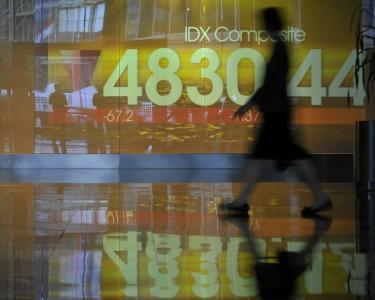Indonesia Falls As Investors Await Voting Result
Bareksa • 17 Jul 2014

Karyawan melintas di depan layar Indeks Harga Saham Gabungan (IHSG) di Bursa Efek Indonesia, Jakarta. - (AntaraFoto/Puspa Perwitasari)
Jakarta's composite index fell 1.4 percent, down from Wednesday's highs.
Bareksa.com - Indonesian stocks retreated on Thursday from a more than 13-month closing high in the previous session as investors awaited the official results of the presidential election, while Thai stocks edged up as bright earnings prospects boosted firms such as TMB Bank.
Jakarta's composite index fell 1.4 percent, down from Wednesday's highs. Selling hit overbought stocks such as Semen Indonesia and Bank Mandiri.
Jakarta's populist governor Joko "Jokowi" Widodo looks set to become Indonesia's next president, according to a private tally of 80 percent of the votes cast, as his rival lashed out at critics, including the capital's biggest English-language newspaper.
The Elections Commission (KPU) is to officially announce the result on July 22.
Bangkok's SET index was up 0.2 percent at 1,533.64, just shy of a more than 13-month high of 1,534.95 hit in the previous session. It is expected to move in a narrow trading band of 1,520-1,540, broker Phillip Securities said.
The momentum started to lose steam as investors wait for resolution of a number of key political and economic issues currently under consideration by the ruling military council, it said.
Shares of TMB Bank, the most actively traded by turnover, jumped 4 percent after positive management guidance and analysts' earnings upgrades.
TMB's management reaffirmed its 2014 loan growth target of 6-8 percent and aimed to cut non-performing loans (NPLs) to below 3 percent, with further NPL sales likely, banking analyst Adisorn Mungparnchon at Phillip Securities wrote in a report.
"Several years of restructuring started to pay off for TMB in terms of higher loan yields, lower funding and operating costs as well as a steady decline in NPLs," he said.
Stocks in the Philippines gained 0.5 percent on resuming trade on Thursday. The stock exchange was shut on Wednesday after its capital shut down due to typhoon Rammasun.
Markets in Singapore, Malaysia and Vietnam were range-bound.
Asian equities dipped amid speculation the U.S. Federal Reserve was tilting towards tighter monetary policy. (Source : Reuters)